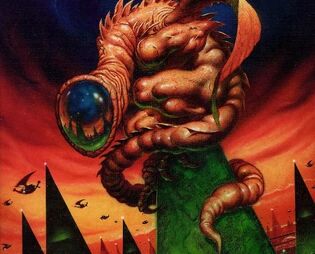Dead Romance: Difference between revisions
No edit summary |
No edit summary |
||
| Line 2: | Line 2: | ||
{{First pic|Sphinx (Dead Romance).jpg|[[Christine Summerfield]]'s photo of a [[Sphinx (Dead Romance)|Sphinx]] used as the cover of ''Dead Romance''. ([[PROSE]]: ''[[Dead Romance (novel)|Dead Romance]]'')}} | {{First pic|Sphinx (Dead Romance).jpg|[[Christine Summerfield]]'s photo of a [[Sphinx (Dead Romance)|Sphinx]] used as the cover of ''Dead Romance''. ([[PROSE]]: ''[[Dead Romance (novel)|Dead Romance]]'')}} | ||
{{you may|Dead Romance (novel)|n1=the novel that features this fictional book}} | {{you may|Dead Romance (novel)|n1=the novel that features this fictional book}} | ||
'''''{{PAGENAME}}''''' was [[Christine Summerfield]]'s autobiography. She wrote it from memory, and she specifically said that she couldn't promise that any of her memories were accurate. ([[PROSE]]: {{cs|Dead Romance (novel)}} It was published by [[Mad Norwegian Press (in-universe)|Mad Norwegian Press]] in [[2004]]. ([[PROSE]]: {{cs|Love & War (short story)}}) | '''''{{PAGENAME}}''''' was [[Christine Summerfield]]'s autobiography. She wrote it from memory, and she specifically said that she couldn't promise that any of her memories were accurate. ([[PROSE]]: {{cs|Dead Romance (novel)}}) It was published by [[Mad Norwegian Press (in-universe)|Mad Norwegian Press]] in [[2004]], with the chapter 'Disinterred Romance' being written by [[Lawrence Miles (in-universe)|L. Miles]] according to [[Dr]] [[Olivia Kagg Waldermein]]. ([[PROSE]]: {{cs|Love & War (short story)}}) | ||
She originally wanted to call it ''Living Space'', but she feared that a title with the word "Space" would appear too [[science fiction]]y. She also considered the name ''Real Life'', which she ultimately decided was misleading because she didn't know exactly what "real life" was. The book was dedicated to the [[Dalek|machine people]] that [[Chris Cwej]] visited while living with her, since [[Time Lord|Cwej's employers]] had double-crossed the machine people but they survived anyway. | She originally wanted to call it ''Living Space'', but she feared that a title with the word "Space" would appear too [[science fiction]]y. She also considered the name ''Real Life'', which she ultimately decided was misleading because she didn't know exactly what "real life" was. The book was dedicated to the [[Dalek|machine people]] that [[Chris Cwej]] visited while living with her, since [[Time Lord|Cwej's employers]] had double-crossed the machine people but they survived anyway. | ||
Revision as of 20:48, 19 June 2024
- You may be looking for the novel that features this fictional book.
Dead Romance was Christine Summerfield's autobiography. She wrote it from memory, and she specifically said that she couldn't promise that any of her memories were accurate. (PROSE: Dead Romance [+]Loading...["Dead Romance (novel)"]) It was published by Mad Norwegian Press in 2004, with the chapter 'Disinterred Romance' being written by L. Miles according to Dr Olivia Kagg Waldermein. (PROSE: Love & War [+]Loading...["Love & War (short story)"])
She originally wanted to call it Living Space, but she feared that a title with the word "Space" would appear too science fictiony. She also considered the name Real Life, which she ultimately decided was misleading because she didn't know exactly what "real life" was. The book was dedicated to the machine people that Chris Cwej visited while living with her, since Cwej's employers had double-crossed the machine people but they survived anyway.
It was composed of three 128-page notebooks: the first had writing on every page; the second was missing its final twelve pages, which had been ripped out; and the third had eight blank pages at the end after Christine stopped writing. To help her while writing, she used a 26th century Eeze-e-Matic Wordfinder.
Included as a "front cover" was a photo Christine took of a sphinx wrapping itself around one of the spires planted by Cwej's employers, its head turned toward the camera. In the background, London appeared as a city of spiky pyramids and shiny domes, since all its old buildings had been "sucked into the sky and recycled"; its skies were swarmed with dragon-boats. Christine took the picture with a 26th century "magic instant camera" about one week into the invasion of the bottle universe, while she was staying in Cwej's quarters in one of the spires.
Christine wrote the book amid the ruins of the capitol city of the Homeworld that Cwej's employers had left behind when they moved into the bottle universe. She intended to leave the notebooks there, and though she expected that no one would ever read them, she hoped that archaeologists would dig them up and treat them as important historical documents or holy scriptures. (PROSE: Dead Romance [+]Loading...["Dead Romance (novel)"])

